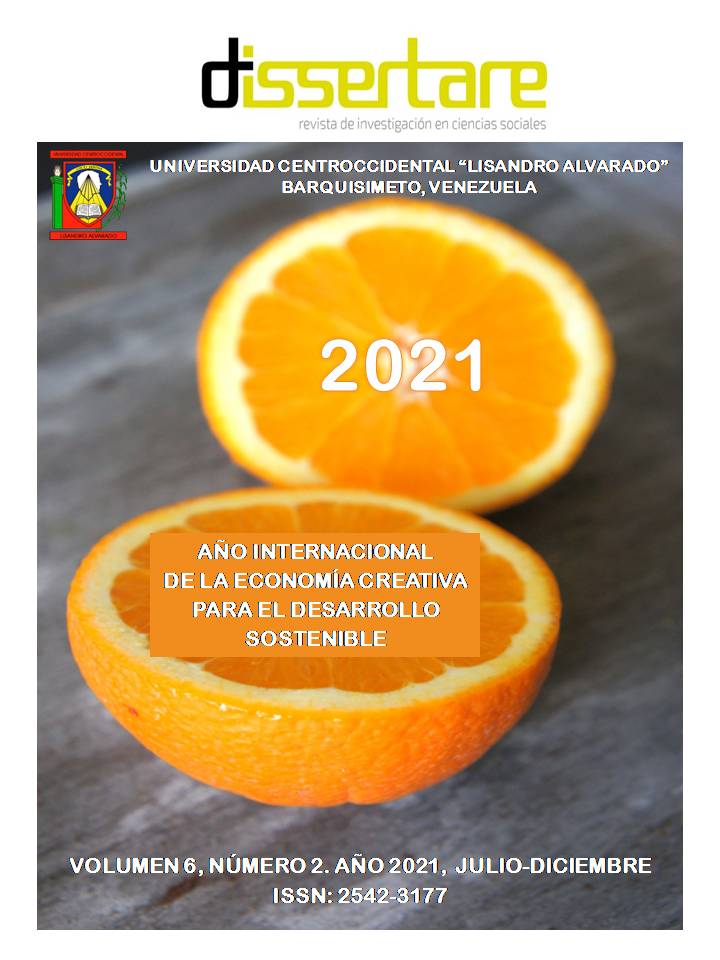An approach to the social dimension of the student community service in Venezuela in times of pandemic by covid-19
Keywords:
community service, social dimension, university,, community, pandemicAbstract
In Venezuela, the Higher Education Student Community Service Law states that community service is an activity that university students must carry out by applying the knowledge acquired during their professional training, for the benefit of society, by linking with communities. This represents a requiremBnt to obtain the respective academic degree. However, the current pandemic by COVID 19 has forced university institutions to carry out these activities in the virtual modality, due to the social distancing measures imposed. Faced with this reality, the following questions arise: Will the work of students who must carry out community service continue to be social, without face-to-face activities in the communities? What are the limitations faced by Venezuelan student community service in the context of the pandemic? The general objective of this essay is to analyze the social dimension of Venezuelan student community service, under the modality of virtual execution during the COVID 19 pandemic. It has a qualitative methodological approach, with documentary design, based on the critical analysis of the subject. It highlights the educational repercussions of the pandemic on community service activity, seriously limited by confinement and social distancing, taking into account the technological gaps that do not favor participation in virtual spaces. It is concluded that without community participation, student community service loses its essence and focus, so actions must be reinforced to reduce morbidity and mortality and to overcome the technological gaps that affect the execution of this socio-educational process.
Downloads
References
Aalai, A. (2020). Challenges of social distancing. https://www.psychologytoday.com/us/blog/the-first-impression/202003/challenges-social-distancing
Cabrera, L. (2020). Efectos del coronavirus en el sistema de enseñanza: aumenta la desigualdad de oportunidades educativas en España. Revista de Sociología de la Educación–RASE, 13(2), 114-139. https://ojs.uv.es/index.php/RASE/article/view/17125/0
Campos Aldana, A. (2008). Una aproximación al concepto de “lo social” desde trabajo social. Revista Tendencias & Retos, (13), 55-70. https://webcache.googleusercontent.com/search?q=cache:RFnKSN5LBJ0J:https://dialnet.unirioja.es/descarga/articulo/4929285.pdf+&cd=1&hl=es&ct=clnk&gl=ve
Carballeda, A. (2004). La intervención en lo social. Exclusión e integración en los nuevos escenarios sociales. Paidós.
CEPAL (2020). América Latina ante la crisis del COVID-19: vulnerabilidad socioeconómica y respuesta social. https://www.cepal.org/es/publicaciones/46484-america-latina-la-crisis-covid-19-vulnerabilidad-socioeconomica-respuesta-social
CEPAL (2021). Las personas afrodescendientes y el COVID-19: develando desigualdades estructurales en América Latina. https://repositorio.cepal.org/bitstream/handle/11362/46620/1/S2000729_es.pdf
CEPAL y UNESCO. (2020). La educación en tiempos de la pandemia de COVID-19 (COVID-19. https://repositorio.cepal.org/bitstream/handle/11362/45904/1/S2000510_es.pdf
Chirinos, E., Figueredo, C., Goyo, A., Méndez, E. (2009). Control organizacional en la realidad y complejidad de las universidades. Negotium, 12(4), 29-43.
Corrosa, L. y López, M. (2006). El Trabajo Social en el área educativa. Desafíos y perspectivas. Editorial Espacio, Buenos Aires.
COTEC (2020). Covid-19 y educación: problemas, respuestas y escenarios. Documento técnico de análisis de la situación educativa derivada de la emergencia sanitaria. https://cotec.es/cotec-publica-un-documento-con-propuestas-para-cinco-posibles-escenarios-educativos-ante-la-crisis-sanitaria-del-covid-19/
Datillio, F. y Freeman, A. (2000) Cognitive behavioral strategies in crisis intervention. New York: The Guilford Press.
Freire, P. (1990). La naturaleza política de la educación. Editorial Paidós.
Gento Palacios, M. (1994). Participación en la gestión educativa. Santillana.
Guijarro, M. y Chávez, J. (2006). Ética y gerencia universitaria. Revista Venezolana de Gerencia, 11(34), 201-220. https://produccioncientificaluz.org/index.php/rvg/article/view/10433/10421
Ley de Servicio Comunitario del Estudiante de Educación Superior (2005). 14 de septiembre de 2005. Gaceta Oficial Nº 38.272.
Morduchowicz, A. (2020). La inversión educativa en tiempos de post pandemia. Enfoque Educación. https://blogs.iadb.org/educacion/es/inversioneducativapostpandemia/
Muñoz, D. (2020). Educación virtual en pandemia. Una perspectiva desde la Venezuela actual. https://revistas.investigacion-upelipb.com/index.php/educare/article/view/1377/1379
Murillo, F., y Duk, C. (2020). El Covid-19 y las brechas educativas. Revista Latinoamericana de Educación Inclusiva, 14(1), 11-13. https://scielo.conicyt.cl/pdf/rlei/v14n1/0718-7378-rlei-14-01-11.pdf
Organización Panamericana de la Salud (2020). OPS advierte una “crisis de salud mental” nunca antes vista. https://www.france24.com/es/20200818-covid19-ops-crisis-de-salud-mental-america-pandemia
Osorio, A. (2017) Primeros auxilios psicológicos. Integración Académica en Psicología, 5(15), 4-11. https://integracion-academica.org/attachments/article/173/01%20Primeros%20Auxilios%20Psicologicos%20-%20AOsorio.pdf
Patria Blog (2022). Día 700. Lucha contra la COVID-19: Venezuela registra 1.228 nuevos contagios. https://covid19.patria.org.ve/
Pizarro, N. (1998). Tratado de metodología de las ciencias sociales. Siglo XXI Editores.
Redondo, E. (2009). Educación y comunicación. Ariel.
Rogero-García, J. (2020). La ficción de educar a distancia. Revista de Sociología de la Educación-RASE, 13(2): 174-182. https://ojs.uv.es/index.php/RASE/article/view/17126
Terrier, J. (2011). Visions of the Social: Society as a Political Project in France, 1750-1950. Brill.
Vargas, I. (2007). Resistencia y participación. Monte Ávila Editores.
Weeden, K. y Cornwell, B. (2020). The small world network of college classes: Implications for epidemic spread on a university campus. Sociological Science, (7), 221-242. https://sociologicalscience.com/download/vol-7/may/SocSci_v7_222to241.pdf
Zemelman, H. (s.f.). Pensar teórico y pensar epistémico. Los retos de las Ciencias Sociales latinoamericanas. https://repository.unad.edu.co/bitstream/handle/10596/5564/Documento7.pdf?sequence=1
Published
How to Cite
Issue
Section
Copyright (c) 2021 MSc. Maritza J. Rojas de González

This work is licensed under a Creative Commons Attribution-NonCommercial-ShareAlike 4.0 International License.
Derechos del/de autor/es a partir del año de publicación
Esta obra está bajo la licencia:
Creative Commons Reconocimiento-NoComercial-CompartirIgual 4.0 Internacional (CC BY-NC-SA 4.0)
Las opiniones expresadas por los autores no necesariamente reflejan la postura del editor de la publicación ni de la UCLA. Se autoriza la reproducción total o parcial de los textos aquí publicados, siempre y cuando se cite la fuente completa y la dirección electrónica de esta revista. Los autores(as) tienen el derecho de utilizar sus artículos para cualquier propósito siempre y cuando se realice sin fines de lucro. Los autores(as) pueden publicar en internet o cualquier otro medio la versión final aprobada de su trabajo, luego que esta ha sido publicada en esta revista.





